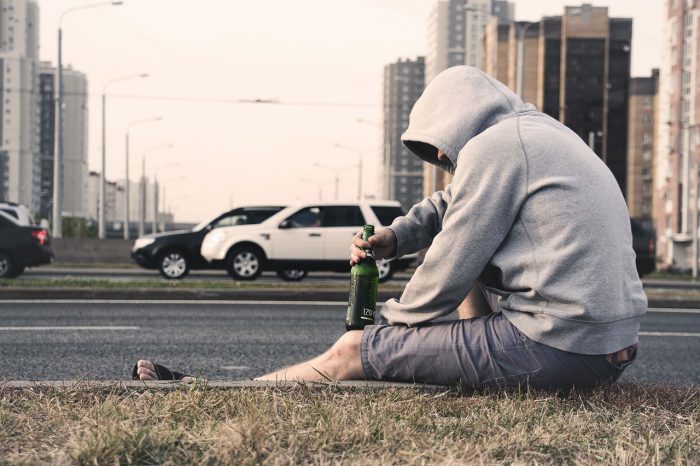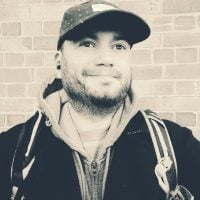It’s been just four months since I’ve stopped drinking.
I had a period of almost a year when I was completely sober for the first time, but with the pandemic and lockdowns and us all trying to navigate through the big unknown that this has brought, I fell back into drinking.
In the winter of 2021, I was binge-drinking so much that a young lady at the local shop started to give me a bottle of Captain Morgan rum without asking.
At that point, I knew I was f*cked. I could hear Russell Brand asking his question, “Are you a bit f*cked?” and realised that I was indeed a bit f*cked.
I was trying to stop, but I rarely lasted a day, and I was back at the beginning of the circle.
Then, on the sixth of January, 2022, I lasted a day, and somehow, I suppose with the help of a power greater than me—dare I say it, God—I didn’t drink ever since.
The first weeks were the hardest and I almost fell back when I was coming home from a COVID-19 test. I still remember clearly that calling to stop at the local shop for some alcohol. I somehow, again, by some power, resisted.
Now I’m not good when it comes to resisting the temptation; I’m pretty weak in this sense. There were times when I was stronger, but we’re talking many years back. I was at my most vulnerable and I’m not sure how I resisted, but somehow I did. (Can I mention this power greater than me again without sounding a bit grandiose? I guess I can. This is my story after all.)
Slowly but surely, I got used to not drinking as if that was who I was. Perhaps there’s a sober version in all of us as there are multiple versions of ourselves present within the fabric of our souls; all it needs is an inspiration. We can recover any version out of the limitless pool of different identities should we want to. Of course, this isn’t easy, but I strongly believe that potential is there—to sculpt a different us into being.
I must credit Russell Brand here, as I believe his book Recovery played a big part in wanting to actually find this new sober version of myself. (So this is my personal thank you—to you, Russell! Namaste.)
Three months after I stopped drinking, I realised this was not where it ended. I realised this was just the beginning of the journey of sculpting the best version of me. It was hard to accept it because I felt like I achieved something, but when you think about it, being sober isn’t exactly a service to anyone but to ourselves—which, of course, is important. It’s actually massively important, but it simply isn’t the end goal. I, as a recovered addict, believe that a 12-steps program must aim for our own service.
So the question started appearing in my mind—at first silently, in the form of a homeless person on the street as I walked home or a person smiling back at me on the bus stop.
I’ve realised I’m not here to just follow my own agenda, but perhaps I am asked to be of service to my fellow humans whom I meet. So I started to play with this idea of helping where I can. I’ve still not figured this out yet, but the thought is there.
They say that the opposite of addiction isn’t sobriety; it’s connection.
And that makes perfect sense after I read a good amount of articles and books on addiction. We need to connect to something—an idea greater than us—to be able to recognise that by being addicted to a substance, a person, or another external object, we are not allowing ourselves to grow beyond the very basic version of being.
And whilst that might be something someone wants to do and be, it kind of feels like a waste of this life, which, as far as we know, only happens once. No one knows if they get another gig here “on this surface of a soft mass on fire on the inside, a surface warmed and lit by an explosion taking place 93 million miles away.” (The Two Kinds of Decay by Sarah Manguso)
Unity
I’ve recently found out that Brian Molko, the lead singer of Placebo, has a tattoo on his hand; it’s a symbol of sobriety and a symbol of Alcoholics Anonymous. It symbolizes the 12-steps recovery program of AA. The triangle in the circle represents the three-part answer to freedom from addiction (unity, recovery, and service), the three-part disease (physical, mental, and spiritual), then the circle then represents wholeness or oneness.
The body should be triangular, stable; the mind circular, open. The triangle represents the means for generation of good energy and is the most stable physical posture. The circle symbolizes serenity and perfection and the source of unlimited potential. Together they represent the perfect union of mind and body.
It has been used in many native cultures. Priests, medicine men, and seers of antiquity regarded the circle enclosing the triangle as a means of warding off spirits of evil. AA’s circle and triangle of Recovery, Unity, and Service has certainly meant all of that to those of us in recovery and much more.
I found his tattoo to be powerful, and in fact, I’m going to get it tattooed soon.
Conclusion
I suppose there’s not much of a conclusion to share at this point, as like I said, I’m only at the beginning of this journey that I call “my recovery.”
There have been many people along the way who helped me realise that I want to be this way and many people who helped me to get to the stage where such realisation has become possible.
Perhaps the one who deserves a huge credit for helping me get to this point is my brother. It was he who got me to read Russell Brand and who turned out to be an incredible inspiration and a great teacher.
So I guess this one’s for you, brother. You always wanted to be proud of me, and I’m sorry I was letting you down. A part of the recovery journey asks us to make amends with those we wronged. That said, I’m sorry for making you wait this long. I hope you can see that I’m on my way.
Peace and light.
~








Read 11 comments and reply